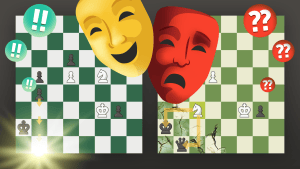Last week we analyzed one of Morphy's games and you had a chance to see why Fischer once said that by the precision of his play Morphy was the best chess player of all time. In Part 4 we saw that Adolf Anderssen would give his opponent a chance because of the temptation of a beautiful combination. Meanwhile Morphy was almost a chess machine and usually chose the line which promised the most efficient way to win the game. Today I would like to present one of his iconic games that features a very important concept.
(Just like in most of my articles I give you a chance to test your chess skills, so the games are given as a Quiz. Please remember that you can always replay the whole game from the first move if you click "Solution" and then "Move list".)
Please note how the Black Queen completely paralyzes the whole White Queen's side. I recommend you to remember this idea. In many cases you want to sacrifice material just to establish your piece or a pawn on the e6 or d6 squares (e3 and d3 for Black). We already saw an example of such a strategy in this article:
http://www.chess.com/article/view/how-to-study-chess-openings Notice that Black was happy to sacrifice his Bishop just to put his pawn on e3 where it totally paralyzed White's King's side. In the next game Emmanuel Lasker sacrificed a pawn on the same d6 square so his opponent's own pawn blocked his natural development!
When half of your opponent's pieces cannot move thanks to your blocking sacrifice, it is a good time to start a direct attack. Let's see the finish of the above-mentioned Morphy game:
So, if in your next game you have an opportunity to hinder your opponent's development, remember this Morphy game and don't hesitate to sacrifice a pawn or even a piece on these 'magical' squares (d6, e6 for White and d3, e3 for Black)!


